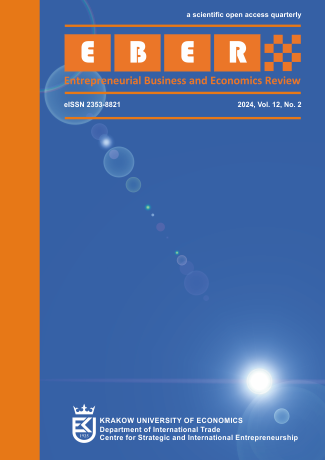What makes them dream big? Determinants of business growth aspirations among Polish students
What makes them dream big? Determinants of business growth aspirations among Polish students
Author(s): Jakub GolikSubject(s): Business Economy / Management, Sociology of the arts, business, education, Socio-Economic Research
Published by: Uniwersytet Ekonomiczny w Krakowie
Keywords: growth aspirations; growth intentions; entrepreneurship; entrepreneurial intention; determinants ;
Summary/Abstract: Objective: The objective of the article is to explore the concept of business growth aspirations and identify its determinants at an early stage of the entrepreneurial process. In this exploratory study, I focused on the underexplored approach to entrepreneurial process i.e. to study the growth aspirations and its determi-nants alongside entrepreneurial intentions. Studying growth aspirations and their determinants provides valuable insights into how these aspirations form. This contributes to the literature and future empirical studies on the entrepreneurial process.Research Design & Methods: On the basis of a literature review, I identified the potential determinants of growth aspirations with a focus on understudied individual and sociocultural dimensions. I tested them em-pirically using binomial logistic regression on data obtained from 757 students from three universities in north-ern Poland. The proposed model includes growth aspirations as an endogenous variable and eight exogenous variables. Firstly, I described the sample with descriptive statistics and correlation matrix using appropriate correlation coefficients (Spearman for variables using ordinal scale and Yule’s phi for binary variables), which I followed with the collinearity checks with the use of variance inflation factors (VIFs). Finally, I discussed the goodness of fit with the discussion of prediction accuracy.Findings: The results show that entrepreneurial self-efficacy and entrepreneurial intention proved to be sta-tistically insignificant. Eventually, I found six of the variables to influence the declared growth aspirations of respondents in a statistically significant way, namely: gender, family business background, entrepreneurial role model, declared resistance to stress, and perception of higher income and prestige as the most attractive features of entrepreneurship. Moreover, I identified a gender gap in growth aspirations. Finally, I verified five out of eight proposed research hypotheses and discussed the conclusions.Implications & Recommendations: The most important finding shows the presence of a gender gap in growth aspirations as early as at the time of studies. Therefore, it is advised that policymakers focus on this gap while designing entrepreneurship courses and take it into account. Secondly, it is important to accu-rately measure stress resistance among students, to show it as a potential advantage, and to teach safe coping strategies. Furthermore, it is recommended to promote the high social status of entrepreneurs, both in the financial (potentially higher income) and non-financial sense (prestige and satisfaction) while at the same time consciously educating about potential dangers.Contribution & Value Added: The study makes an original contribution to the literature on growth aspirations by answering the call to further explore their potential antecedents and is one of the first to do so at the earliest stage of the entrepreneurial process. It is achieved by studying determinants pertaining to sociocultural and in-dividual dimensions which – according to some studies – require further investigation. Moreover, it is done in an unexplored context of students in a developing country in Europe. Finally, the article recognises the ambiguity in defining growth aspirations and suggests a clear distinction to be included in the literature and future research
Journal: Entrepreneurial Business and Economics Review
- Issue Year: 12/2024
- Issue No: 2
- Page Range: 61-77
- Page Count: 17
- Language: English

